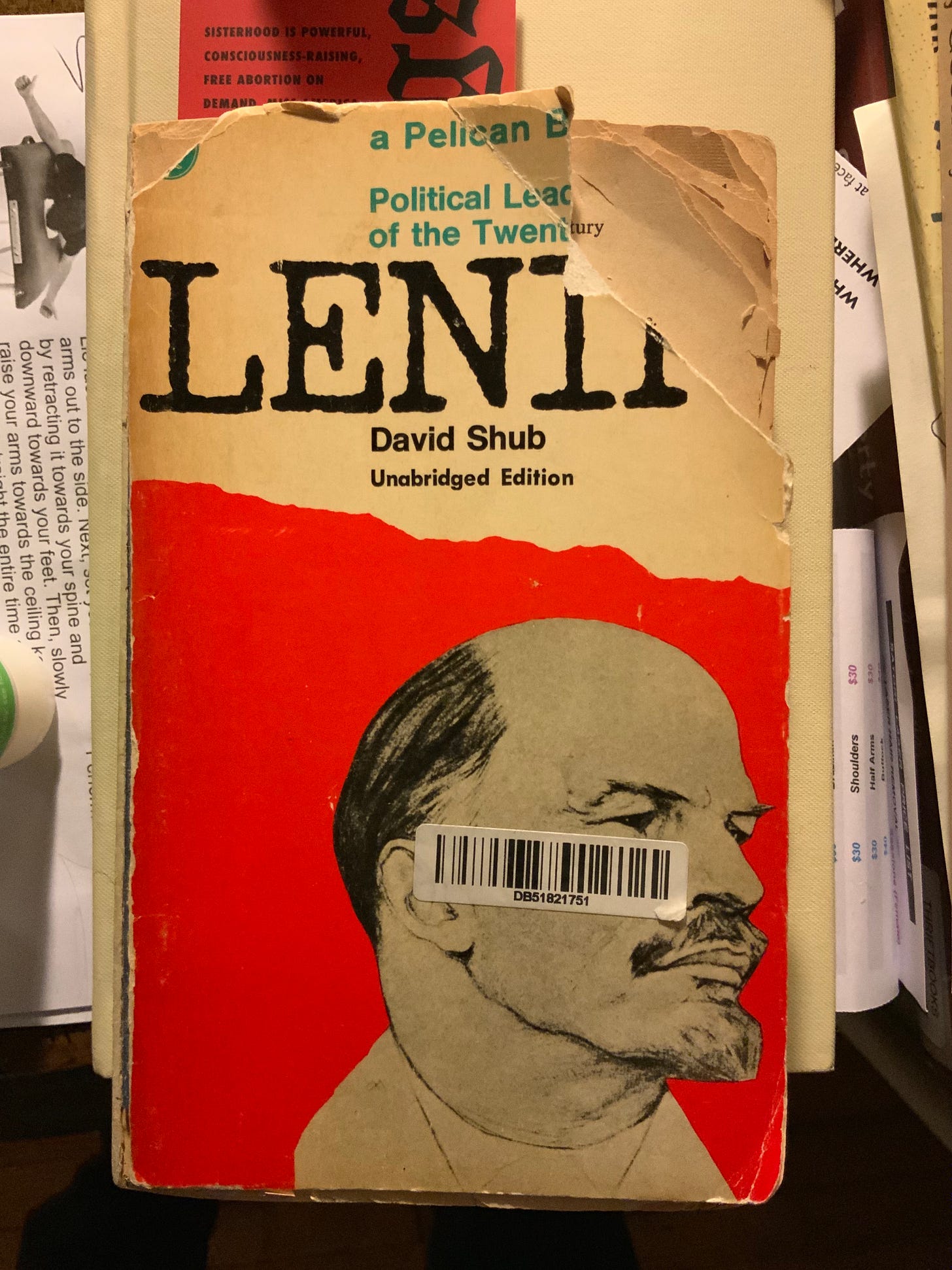I haven’t had much of a chance to write over the last month, but I’ve been reading a lot — mostly things that give some background to my family’s early Soviet history, which has led me to Lenin and Stalin and Luxemburg and some Kautsky and Trotsky. That’s what happens when you try to probe the depths of the Nationalism Question that was being debated and fought over at the beginning of the century. I’ll get into that later. But reading Lenin and his attacks on the notion that Jews in the Pale of Settlement constitute a distinct and separate nationality reminded me of a great forgotten Lenin biography that I keep wanting to mention.
I first learned about it a year or so before the pandemic, when I was researching the origins of various CIA propaganda projects in the New York Public Library. It’s called Lenin. And it’s by David Shub. It’s long out of print, but you can pick up a used copy for around $5 on the internet. Make sure to get the revised paperback edition.
David Shub came from a similar background to my own family. He was born to Russian Jews in the Russian Empire in Ukraine at the end of the 19th century. He joined Russia’s socialist revolutionaries in his teens, spent time as a minor player in the rev scene in Europe, met Lenin and other main players in that world, and ended up on the Menshevik side when the Social Democratic Labour Party split. He went back to Russia to take part in the 1905 Revolution but was arrested and conscripted into forced military service in Siberia. He escaped and made his way to New York, where he then spent the rest of his life — mostly working at the city’s Yiddish lefty newspaper, The Forward. A pretty standard life for a young radical who got shucked out of the revolution.
David is a good, clear writer. And his bio of Lenin gets off to a great start, naturally framing Lenin’s revolutionary zeal through his brother Aleksandr Ulyanov, who was a member of the People’s Will and who was executed for a botched attempt to assassinate Alexander III. It’s a well-known part of Lenin’s life. But it’s also the most overlooked, too. Revenge as a motive. And out of that revenge came the Soviet Union. And not just the Soviet Union, but the total seizure and destruction of all royal and aristocratic wealth and the execution of the czar and his perfect czarish family. Has anyone else in history pulled off such a massive personal retribution so successfully? I don’t think so. Kinda surprised Hollywood hasn’t made a movie about it yet. I thought anticapitalism is all the rage these days?
Being a Menshevik, David is obviously against the Bolsheviks and is critical of Lenin and his centralized and authoritarian political style. Shub is on the side of the original Russian socialists like Herzen, who argued for a gradualist and a non-coercive path. Shub’s argument, stripped down, is that Lenin was a kind of reincarnation of Sergey Nechayev, the failed scammer anarchist who wanted to will the revolution into being through violence and mayhem. Nechayev inspired my favorite Dostoevsky book, The Demons. I don’t know if it’s fair or not to compare Lenin to Nechayev — probably not, but it’s a good literary device and some of the blows land pretty well. But despite the obvious anti-Lenin slant, the bio is very sympathetic to the man. David is clearly in awe of Lenin and has deep respect for him. What you don’t get out of this book is some sort of caricature that paints Lenin and the Bolsheviks as supreme cynics who simply used the revolution as cover while they hoodwinked Petrograd’s workers and soldiers to grab personal power for themselves.
Looking over some of the notes I scribbled in the margins of the section that deals with the history of Russia’s revolutionary movement, it’s hard to disagree with some of David Shub’s more theoretical criticism of the Bolsheviks — especially looking at it today. In the end, the revolutionary society they created failed. Russia swung right back to the 19th century, right where it had all started.




